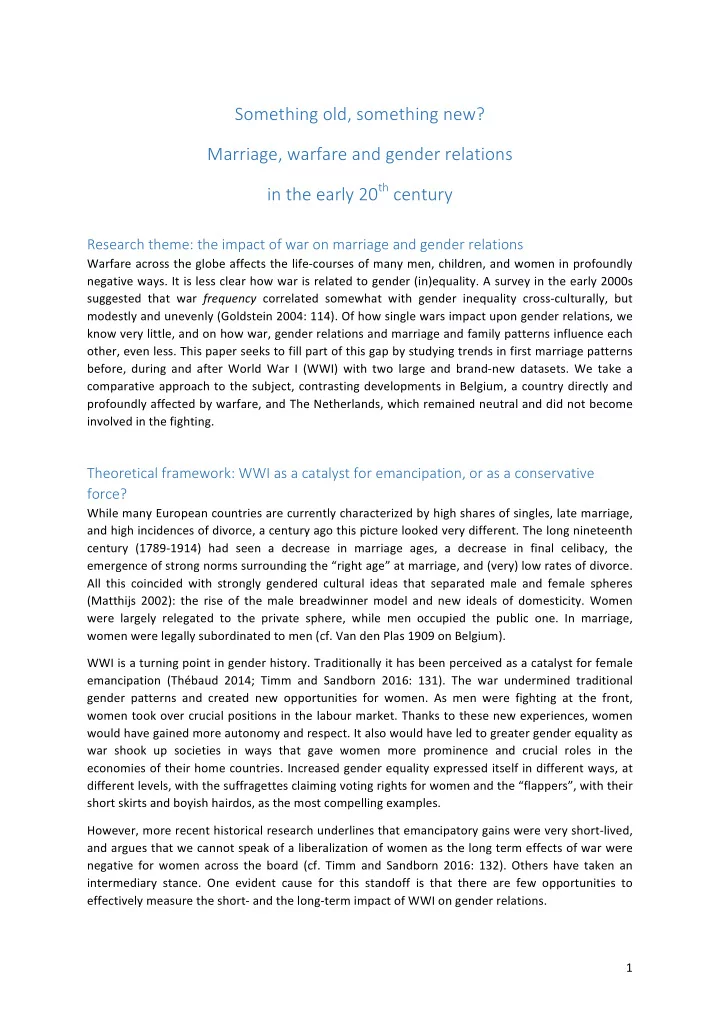

Something ¡old, ¡something ¡new? ¡ ¡ Marriage, ¡warfare ¡and ¡gender ¡relations ¡ ¡ in ¡the ¡early ¡20 th ¡century ¡ ¡ ¡ Research ¡theme: ¡the ¡impact ¡of ¡war ¡on ¡marriage ¡and ¡gender ¡relations ¡ ¡ Warfare ¡across ¡the ¡globe ¡affects ¡the ¡life-‑courses ¡of ¡many ¡men, ¡children, ¡and ¡women ¡in ¡profoundly ¡ negative ¡ways. ¡It ¡is ¡less ¡clear ¡how ¡war ¡is ¡related ¡to ¡gender ¡(in)equality. ¡A ¡survey ¡in ¡the ¡early ¡2000s ¡ suggested ¡ that ¡ war ¡ frequency ¡ correlated ¡ somewhat ¡ with ¡ gender ¡ inequality ¡ cross-‑culturally, ¡ but ¡ modestly ¡and ¡unevenly ¡(Goldstein ¡2004: ¡114). ¡Of ¡how ¡single ¡wars ¡impact ¡upon ¡gender ¡relations, ¡we ¡ know ¡very ¡little, ¡and ¡on ¡how ¡war, ¡gender ¡relations ¡and ¡marriage ¡and ¡family ¡patterns ¡influence ¡each ¡ other, ¡even ¡less. ¡This ¡paper ¡seeks ¡to ¡fill ¡part ¡of ¡this ¡gap ¡by ¡studying ¡trends ¡in ¡first ¡marriage ¡patterns ¡ before, ¡ during ¡ and ¡ after ¡ World ¡ War ¡ I ¡ (WWI) ¡ with ¡ two ¡ large ¡ and ¡ brand-‑new ¡ datasets. ¡ We ¡ take ¡ a ¡ comparative ¡approach ¡to ¡the ¡subject, ¡contrasting ¡developments ¡in ¡Belgium, ¡a ¡country ¡directly ¡and ¡ profoundly ¡affected ¡by ¡warfare, ¡and ¡The ¡Netherlands, ¡which ¡remained ¡neutral ¡and ¡did ¡not ¡become ¡ involved ¡in ¡the ¡fighting. ¡ ¡ ¡ ¡ Theoretical ¡framework: ¡WWI ¡as ¡a ¡catalyst ¡for ¡emancipation, ¡or ¡as ¡a ¡conservative ¡ force? ¡ ¡ While ¡many ¡European ¡countries ¡are ¡currently ¡characterized ¡by ¡high ¡shares ¡of ¡singles, ¡late ¡marriage, ¡ and ¡high ¡incidences ¡of ¡divorce, ¡a ¡century ¡ago ¡this ¡picture ¡looked ¡very ¡different. ¡The ¡long ¡nineteenth ¡ century ¡ (1789-‑1914) ¡ had ¡ seen ¡ a ¡ decrease ¡ in ¡ marriage ¡ ages, ¡ a ¡ decrease ¡ in ¡ final ¡ celibacy, ¡ the ¡ emergence ¡of ¡strong ¡norms ¡surrounding ¡the ¡“right ¡age” ¡at ¡marriage, ¡and ¡(very) ¡low ¡rates ¡of ¡divorce. ¡ All ¡ this ¡ coincided ¡ with ¡ strongly ¡ gendered ¡ cultural ¡ ideas ¡ that ¡ separated ¡ male ¡ and ¡ female ¡ spheres ¡ (Matthijs ¡ 2002): ¡ the ¡ rise ¡ of ¡ the ¡ male ¡ breadwinner ¡ model ¡ and ¡ new ¡ ideals ¡ of ¡ domesticity. ¡ Women ¡ were ¡ largely ¡ relegated ¡ to ¡ the ¡ private ¡ sphere, ¡ while ¡ men ¡ occupied ¡ the ¡ public ¡ one. ¡ In ¡ marriage, ¡ women ¡were ¡legally ¡subordinated ¡to ¡men ¡(cf. ¡Van ¡den ¡Plas ¡1909 ¡on ¡Belgium). ¡ ¡ WWI ¡is ¡a ¡turning ¡point ¡in ¡gender ¡history. ¡Traditionally ¡it ¡has ¡been ¡perceived ¡as ¡a ¡catalyst ¡for ¡female ¡ emancipation ¡ (Thébaud ¡ 2014; ¡ Timm ¡ and ¡ Sandborn ¡ 2016: ¡ 131). ¡ The ¡ war ¡ undermined ¡ traditional ¡ gender ¡ patterns ¡ and ¡ created ¡ new ¡ opportunities ¡ for ¡ women. ¡ As ¡ men ¡ were ¡ fighting ¡ at ¡ the ¡ front, ¡ women ¡took ¡over ¡crucial ¡positions ¡in ¡the ¡labour ¡market. ¡Thanks ¡to ¡these ¡new ¡experiences, ¡women ¡ would ¡have ¡gained ¡more ¡autonomy ¡and ¡respect. ¡It ¡also ¡would ¡have ¡led ¡to ¡greater ¡gender ¡equality ¡as ¡ war ¡ shook ¡ up ¡ societies ¡ in ¡ ways ¡ that ¡ gave ¡ women ¡ more ¡ prominence ¡ and ¡ crucial ¡ roles ¡ in ¡ the ¡ economies ¡of ¡their ¡home ¡countries. ¡Increased ¡gender ¡equality ¡expressed ¡itself ¡in ¡different ¡ways, ¡at ¡ different ¡levels, ¡with ¡the ¡suffragettes ¡claiming ¡voting ¡rights ¡for ¡women ¡and ¡the ¡“flappers”, ¡with ¡their ¡ short ¡skirts ¡and ¡boyish ¡hairdos, ¡as ¡the ¡most ¡compelling ¡examples. ¡ ¡ However, ¡more ¡recent ¡historical ¡research ¡underlines ¡that ¡emancipatory ¡gains ¡were ¡very ¡short-‑lived, ¡ and ¡argues ¡that ¡we ¡cannot ¡speak ¡of ¡a ¡liberalization ¡of ¡women ¡as ¡the ¡long ¡term ¡effects ¡of ¡war ¡were ¡ negative ¡ for ¡ women ¡ across ¡ the ¡ board ¡ (cf. ¡ Timm ¡ and ¡ Sandborn ¡ 2016: ¡ 132). ¡ Others ¡ have ¡ taken ¡ an ¡ intermediary ¡ stance. ¡ One ¡ evident ¡ cause ¡ for ¡ this ¡ standoff ¡ is ¡ that ¡ there ¡ are ¡ few ¡ opportunities ¡ to ¡ effectively ¡measure ¡the ¡short-‑ ¡and ¡the ¡long-‑term ¡impact ¡of ¡WWI ¡on ¡gender ¡relations. ¡ ¡ ¡ 1 ¡
Recommend
More recommend